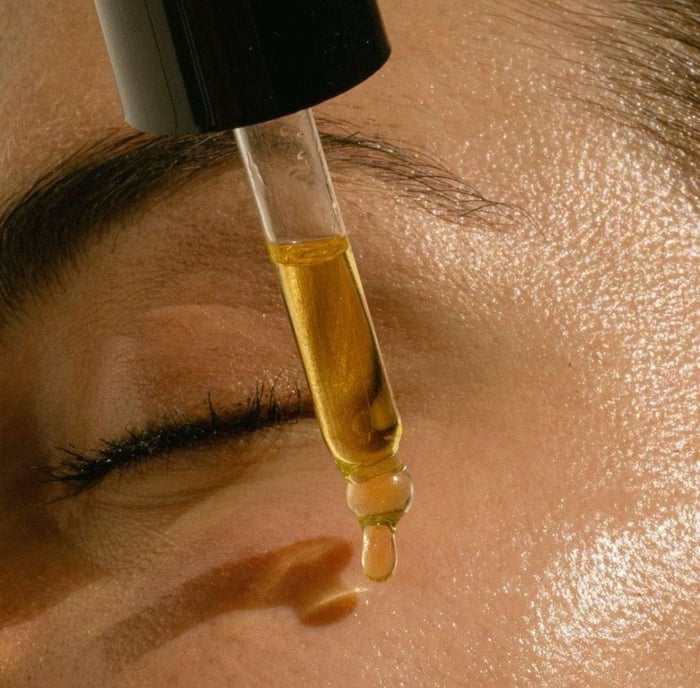What is Retinol?
Retinol is widely used in the cosmetics industry and is known as one of the most effective and widely researched anti-aging ingredients. Along with its structurally similar counterparts, the retinoids, retinol is also known for its effectiveness in the treatment of pathological skin conditions, including acne, psoriasis, and ichthyosis.
Despite their impressive benefits, retinoids can cause side effects, such as skin sensitivity to sunlight, skin dryness, redness, flaking and thinning of the skin microbiome. Therefore, it is often recommended to use retinoid-containing products only in the evenings and always in combination with a sunscreen.
Botanical retinols are plant-derived compounds that mimic the effects of retinoids, which are Vitamin A derivatives. Unlike synthetic retinoids, botanical retinols are not irritating, making them suitable for even sensitive skin. Here's a detailed look at the science behind these natural alternatives:
Retinoic acid, the most potent form of retinol, is primarily responsible for the impact of retinol on the skin. It can bind to specific nuclear receptors and thereby regulate gene expression. Given its crucial role in skin maintenance, retinoic acid is naturally present in skin cells, where it is degraded into its nonfunctional metabolite hydroxy-retinoic acid by enzymes. A strategy to overcome these limitations is to increase the levels of naturally occurring retinoic acid from bioavailable sources.
EU Retinol Ban
The European Union regulators have put a blanket restriction on all skincare products containing more than 0.3 per cent retinol and body care products containing 0.05 per cent retinol. Starting from 1 November 2025, new products that do not adhere to those restrictions cannot enter the EU market.
The EU’s decision to restrict the concentration of retinol in over-the-counter products stems from concerns about its potential for causing skin irritation and harm at higher concentrations. This regulation is in place to safeguard consumers from adverse effects such as redness, peeling, and increased sensitivity to sunlight, which are more likely to occur with higher concentrations of retinol without proper guidance and supervision
Botanical Retinols and Their Sources
- Bakuchiol:
- Source: Derived from the seeds and leaves of the Psoralea corylifolia plant.
- Mechanism: Bakuchiol has a similar gene expression profile to retinol, influencing pathways involved in collagen production, melanin synthesis, and cell turnover. It has antioxidant, anti-inflammatory, and anti-bacterial properties.
- Rosehip Oil:
- Source: Extracted from the seeds of the Rosa canina plant.
Mechanism: Contains natural trans-retinoic acid (a form of Vitamin A), which promotes cell regeneration and increases collagen production. It also has essential fatty acids that help repair and regenerate damaged skin tissues.
- Papaya Seed Oil:
- Source: Extracted from the seeds of the Carica Papaya plant.
- Mechanism: Carotenoids are vitamin A (retinol) derivates like β-carotene, astaxanthin, lycopene and retinol, which are all highly effective antioxidants and have been documented to possess photoprotective properties. Papaya is rich in beta-carotene (a precursor to Vitamin A), which gets converted into retinol in the skin. It helps in skin cell renewal and has antioxidant properties. https://www.ncbi.nlm.nih.gov/pmc/articles/PMC3583891/
- Microalgae (Chlorella Vulgaris)
- Source: Derived from Mediterranean Sea algae
- Mechanism: C. Vulgaris mainly contains lutein and β-carotene (mixotrophic), Carotenes get converted to Vitamin A (trans-retonic acid). When applied topically, Chlorella vulgaris extract can help skin to synthesize more collagen. https://www.sciencedirect.com/science/article/abs/pii/S1756464618304717
Mechanisms of Action
- Collagen Synthesis:
- Retinoids stimulate fibroblasts to produce collagen, the protein responsible for skin elasticity and firmness. Botanical retinols like bakuchiol, Papaya and Microalgae also promote collagen production, helping to reduce the appearance of fine lines and wrinkles.
- Cell Turnover:
- Retinoids increase the rate of cell turnover, shedding dead skin cells and promoting the growth of new ones. This results in a smoother and more even skin texture. Botanical retinols similarly enhance cell turnover, leading to brighter and more youthful-looking skin.
- Antioxidant Activity:
- Retinoids and botanical retinols both exhibit antioxidant properties, neutralizing free radicals that cause oxidative stress and premature aging. This helps in maintaining the skin's integrity and resilience.
- Anti-inflammatory Effects:
- Chronic inflammation can accelerate skin aging. Botanical retinols have anti-inflammatory properties that soothe the skin and reduce redness, making them suitable for acne-prone and sensitive skin.
Clinical Evidence
- Comparative Studies: Scientific research has shown that botanicals retinols perform similarly to synthetic retinol in terms of reducing wrinkles and hyperpigmentation but without the side effects like dryness and irritation.
- Safety Profile: Botanical retinols are generally well-tolerated and can be used during the day without increasing photosensitivity, unlike synthetic retinoids that require nighttime application and strict sun protection.
Practical Application
Due to their gentle nature, botanical retinols can be used by individuals with sensitive skin or those new to retinoid products. They can be applied daily, unlike synthetic retinoids that might need gradual introduction to avoid irritation.
Conclusion
Botanical retinols provide a natural and gentle alternative to traditional retinoids, offering similar anti-aging benefits with a lower risk of irritation. Their efficacy in promoting collagen synthesis, enhancing cell turnover, and providing antioxidant protection makes them valuable ingredients in modern skincare regimens. As research continues to evolve, more plant-derived retinol alternatives may be discovered, further expanding the options for those seeking effective and natural skincare solutions.
Bio- Retinol Products to Shop Now
£75.00
Replenish, Brighten & Firm An indulgent skin-reparative magnet with a multitasking potent formula inspired by the ancient Queen of Sheba. Fast absorbing and works to balance skin's PH and promote cell renewal, leaving skin glowing and radiant. ✔️ Restores Radiance… read moreMakeda Radiance Ageless Botanical Oil


